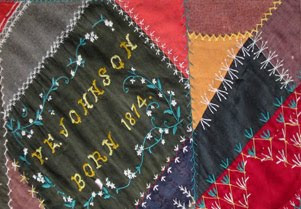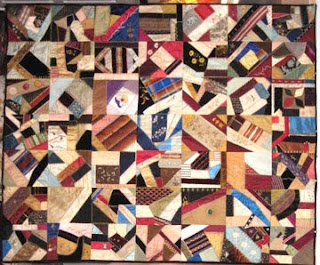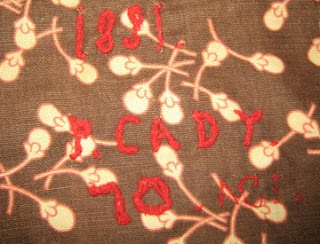Interpreting statistics requires some art as well as science. My last post was about outliers---Crazy Quilts with dates inscribed on them that were outside the trends. Choosing what to include in the data and what to eliminate is interpretation.

Here's a detail of one with an obvious commemorative date of 1874. The quilt wasn't made then; the date commemorates a birthday. I wouldn't include it as a date-inscribed quilt.
Crazy Quilt date-inscribed 1887
Crazy Quilt date-inscribed 1882
The database I developed 20 years ago had as the earliest examples three quilts dated 1882.
I found this top in an online auction. It's crazy---made up of random shaped pieces.
Although the embroidery is rather minimal, the seams are covered with decorative stitching, a characteristic of crazy quilts.
And it's dated 1881 (that second 8 is a little odd but I think that's what it says.)
1881.
P. Cady.
70.AGE
This one might be a commemorative quilt much like those dated 1874, an outlier. But the date of 1881 is not far enough outside the trend to eliminate it, so I have to change my conclusions. I have to conclude that the earliest example is dated 1881.
It is an interesting quilt. Most of the 1880 crazies are made of silk and silk combination fabrics with lavish embroidery, but this one is made of delaines and challis, combination fabrics of wool and cotton, clothing popular before the 1880s.
We don't want to draw any conclusions about the origins of the crazy quilt style based on one example. I am always looking for crazies dated before 1884 and hope to find more dated 1881.
Let's hope whoever bought the delaine crazy top didn't intend to use it as a cutter. It's not the most dramatic quilt but it does seem to have some historical significance.









Thank you for your lesson on crazy quilts. They've always appealed to me. It's fun to learn more about them.
ReplyDeleteBeautiful quilts. So inspiring. I really enjoy reading your blog.
ReplyDeleteWow, interesting post, thank you!
ReplyDelete